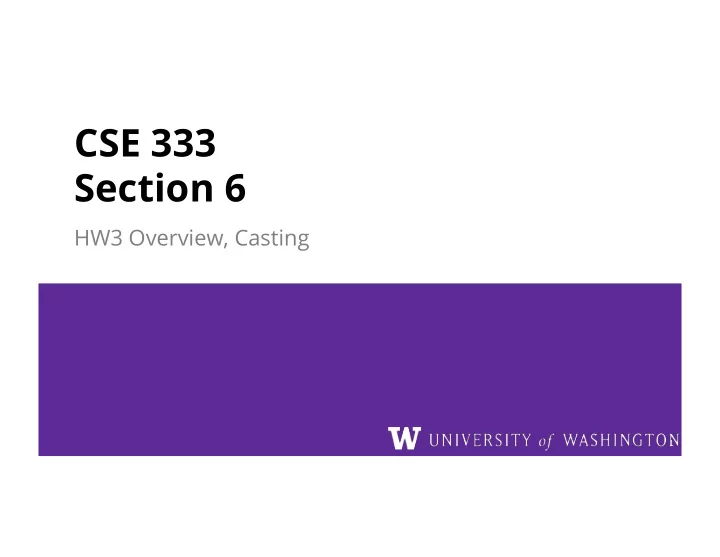

CSE 333 Section 6 HW3 Overview, Casting 1
Section Plan Casting ● HW 3 Overview ● 3
Casting! 4
Casting in C++ Four different casts that are more explicit: 1. static_cast<to_type>(expression) 2. dynamic_cast<to_type>(expression) 3. const_cast<to_type>(expression) 4. reinterpret_cast<to_type>(expression) When programming in C++, you should use these casts! 5
Static Cast static_cast<to_type>(expression) Used to: 1) Convert pointers of related types Base* b = static_cast<Base*>(new Derived); - compiler error if types aren't related 2) Non-pointer conversion int qt = static_cast<int>(3.14); 6
Static Cast static_cast<to_type>(expression) [ ! ] Be careful when casting down : Derived* d = static_cast<Derived*>(new Base); d->y = 5; - compiler will let you do this - dangerous if you want to do things defined in Derived , but not in Base ! 7
Dynamic Cast dynamic_cast<to_type>(expression) Used to: 1) Convert pointers of related types Base* b = dynamic_cast<Base*>(new Derived); - compiler error if types aren't related - at runtime , returns nullptr if it is actually an unsafe downwards cast: Derived* d = dynamic_cast<Derived*>(new Base); 8
Const Cast const_cast<to_type>(expression) Used to: 1) Add or remove const-ness const int x = 5; const int *ro_ptr = &x int *ptr = const_cast<int*>(ro_ptr); 9
Reinterpret Cast reinterpret_cast<to_type>(expression) Used to: 1) Cast between incompatible types int* ptr = 0xDEADBEEF; int64_t x = reinterpret_cast<int64_t>(ptr); - types must be of same size - does not do float-integer conversions 10
Exercise 1 11
reinterpret_cast<char *> dynamic_cast<Derived *> static_cast<Base *> static_cast<int64_t> 12
HW 3 Overview! 13
14 Index File Crawling a file tree in HW2 takes a long time. To save time, write the completed DocTable and MemIndex to a File!
15 Index File Components Header (metadata) DocTable MemIndex
16 Index File Header - magic_number: 0xCAFEF00D - checksum: mathematical signature - doctable_size: in bytes - index_size: in bytes
17 Index File Header - HEX 1. Find a hex editor/viewer of your choice • xxd <indexfile> • hexdump –vC <indexfile> • Pipe the output into a file or less to view The header: Magic word Checksum Doctable size Index size man xxd man hexdump
18 Byte Ordering and Endianness • Network (Disk) Byte Order (Big Endian) • The most significant byte is stored in the highest address • Host byte order • Might be big or little endian, depending on the hardware • To convert between orderings, we can use • uint32_t htonl (uint32_t hostlong); // host to network • uint32_t ntohl (uint32_t hostlong); // network to host • Pro-tip: The structs in HW3 have toDiskFormat() and toHostFormat() functions that will convert endianness for you.
19
20 DocTable & MemIndex • At their core, both DocTable & MemIndex are HashTables. • Lets first look at how we write a HashTable.
21 HashTable • HashTable can have varying amount of buckets, so start with num_buckets. • Buckets can be of varying lengths. To know the offset, we store some bucket records.
22 Buckets • A bucket is a list that contains elements in the table. Offset to a bucket is found in a bucket record. • Elements can be of various sizes, so we need to store element positions to know where each element is.
23 DocTable & MemIndex • At their core, both DocTable & MemIndex are HashTables. • The difference between DocTable and MemIndex is entirely what type of element is stored in them.
24 doctable
25 DocTable (Hex) The header Num buckets ( Chain len Bucket offset )*
26 doctable The buckets: ( (Element offset) n ( DocID Filename len Filename ) n )*
27 doctable
28 index
29 docID table
30 The Full Picture
31 HW Tips • When Writing, you should (almost) always: 1. .toDiskFormat() 2. fseek() 3. fwrite() • When Reading, you should (almost) always: 1. fseek() 2. fread() 3. .toHostFormat() • The most common bugs in the hw involve forgetting to change byte ordering, or forgetting to fseek().
Actual directory: /minidir /tinydir goodbye.txt hello.txt
33 Hex View Exercise • Split up into break out rooms. • Take a look at https://courses.cs.washington.edu/courses/cse333/20au/sections/sec06.idx • Log into attu, use wget to download the file, then look into it. • Try to figure out: How many documents are in this index? Which words are in each document?
34 Hex View Exercise • Split up into break out rooms. • Take a look at https://courses.cs.washington.edu/courses/cse333/20au/sections/sec06.idx • Log into attu, use wget to download the file, then look into it. • Try to figure out: How many documents are in this index? Which words are in each document? • Answer: This index file was built off of test_tree/tiny
Recommend
More recommend